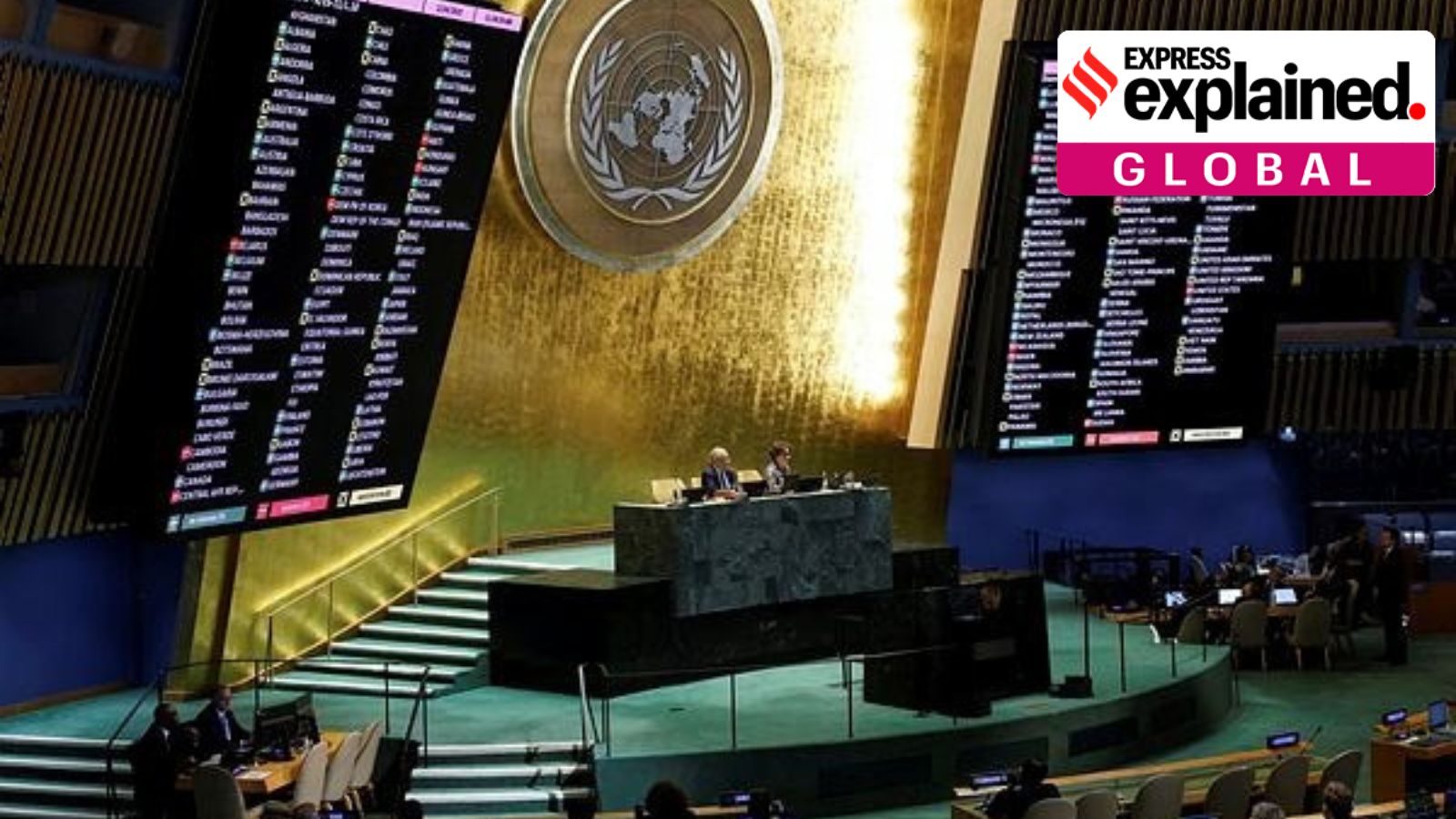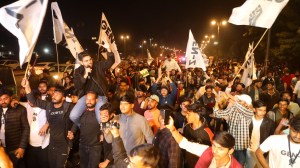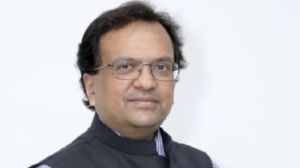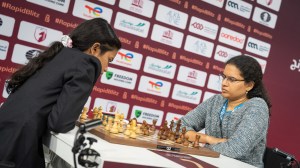The United States suffered setbacks in two duels with its European allies at the United Nations General Assembly before it pulled one back at the Security Council on Monday (February 24), the third anniversary of the war in Ukraine.
At the end of the day’s drama, the transatlantic partnership that is already facing an existential threat from a US policy reversal under President Donald Trump appeared to have frayed further.

India abstained on both UNGA resolutions, signalling foreign policy independence, but also betraying its diplomatic constraints.
Here’s what happened
Ukraine introduced a three-page resolution demanding Russia’s withdrawal from its territory, “de-escalation, an early cessation of hostilities and a peaceful resolution of the war against Ukraine”, and a “comprehensive, lasting and just peace”.
The US brought its own three-paragraph resolution seeking “a swift end to the conflict and… a lasting peace between Ukraine and Russia”, but did not condemn Russia’s aggression. Earlier this month, Trump accused President Volodymyr Zelenskyy of “starting” the war.
 People gather on the third anniversary of the war in Ukraine in Krakow, Poland, February 24 (Reuters)
People gather on the third anniversary of the war in Ukraine in Krakow, Poland, February 24 (Reuters)
Ukraine’s resolution was passed 93-18, with 65 abstentions. The Group of 7 (G7) barring the US voted with the Ukrainians; the US, Russia, and Israel voted against. China, Russia’s close ally since the war began, abstained.
When the US resolution was taken up, France proposed amendments saying the conflict was the result of a “full-scale invasion of Ukraine by the Russian Federation”. After the amendments were incorporated, the US abstained on its own resolution, which passed 93-8 with 73 abstentions.
Story continues below this ad
A resolution similar to the original US draft was then moved in the 15-member Security Council, where Russia vetoed the European amendments. This resolution passed 10-0, with France and the UK among the 5 abstentions.
 Servicemen of the 44th Separate Artillery Brigade of the Armed Forces of Ukraine prepare to fire a 155-mm FH70 howitzer towards Russian troops at a frontline, amid Russia’s attack on Ukraine, in Zaporizhzhia region, Ukraine February 21, 2025. (REUTERS)
Servicemen of the 44th Separate Artillery Brigade of the Armed Forces of Ukraine prepare to fire a 155-mm FH70 howitzer towards Russian troops at a frontline, amid Russia’s attack on Ukraine, in Zaporizhzhia region, Ukraine February 21, 2025. (REUTERS)
The UNSC vote took place as President Trump met President Emmanuel Macron of France in the White House, and the two leaders had a call with other leaders of the G7.
Change in the US position
This was the first time since President Vladimir Putin’s invasion of Ukraine that the US voted with Russia and against its Western allies in the UN — a major departure and a break with Europe.
“Imagine a situation in which [football superstars] Lionel Messi and Cristiano Ronaldo start playing for the opponent’s team after half-time,” a senior European diplomat told The Indian Express. “That is what the US has done to Europe. After three years of supporting us on Ukraine, they are now playing on the side of the Russians,” the diplomat said.
Story continues below this ad
The changed US position was in line with Trump’s direct outreach to Putin, his insults of Zelenskyy, and the exclusion of both Ukraine and Europe from the talks between the Americans and the Russians that took place in Riyadh on February 12.
Trump wants a “deal” with Russia to end the war — perhaps by Easter. He wants access to Ukraine’s minerals and hydrocarbons, but Ukraine wants firm security guarantees first.
It is noteworthy that the 93 votes condemning the Russian aggression were far less than the 140-plus cast in favour of Ukraine in previous UN resolutions — and less than half the UNGA membership of 193.
India’s UN abstentions…
The abstentions by India were no surprise.
Before Monday, India had abstained at the UNSC at least six times and at the UNGA at least 12 times on resolutions on the Ukraine war. It has also abstained on war-related resolutions at other global platforms such as the International Atomic Energy Agency (IAEA), World Trade Organization (WTO), UNESCO, and World Health Organization (WHO).
Story continues below this ad
India has strategic partners on both sides, and it has been walking the diplomatic tightrope since the beginning of the war. The strategic multi-alignment is part of New Delhi’s diplomatic toolkit, which helped when the 2023 G20 Leaders Summit produced a joint communique.
However, New Delhi has never supported the Russian aggression against Ukraine — and it has flagged the need to respect “territorial integrity” and “sovereignty”, the “UN charter”, and “international law”. Prime Minister Narendra Modi famously reminded President Putin in September 2022 that “this is not an era of war”.
India had also condemned the Bucha massacre early in the war, and backed the call for an international probe — significant because New Delhi has been generally wary of such interventions.
New Delhi has always asserted that it is on the side of “peace”. Its vote in the UN on Monday showed that its neutral stance has not been impacted by Trump’s upending of the position taken by the US in the conflict.
Story continues below this ad
Sources in the Indian foreign policy establishment said this had been a “difficult call”, but India had decided to “hold the line” — an assertion of the strategic autonomy of Indian foreign policy.
…And one significant nuance
Faced with the new geopolitical reality of direct US-Russia talks on Ukraine and the rapidly changing contours of the transatlantic alliance, India has nuanced its framing of the war slightly — moving from “two parties to the conflict” to the broader “parties concerned”.
Ahead of his meeting with Russia’s Foreign Minister Sergey Lavrov on the sidelines of the G20 Foreign Ministers’ meeting in Johannesburg on February 20, External Affairs Minister S Jaishankar said: “…We have long advocated dialogue and diplomacy [on the conflict]. Today, the world expects that parties concerned deal with each other to end the war.”
This was different from what Pavan Kapoor, the Indian representative at the peace summit on Ukraine organised by Switzerland, said on June 16, 2024.
Story continues below this ad
Kapoor, who is now India’s Deputy National Security Advisor, said: “We continue to believe that such a peace requires bringing together all stakeholders and a sincere and practical engagement between the two parties to the conflict… Accordingly, we will continue to engage with all stakeholders as well as the two parties to the conflict to contribute to all earnest efforts to achieve lasting peace in Ukraine.”
Moving from “two parties to the conflict”, viz. Russia and Ukraine, to the more general “parties concerned” widens the frame to include other countries as well — perhaps the US, with or without Europe. Despite the reference to “stakeholders” earlier, the mention of the “two parties to the conflict” had been very specific.
The reframing is an acknowledgement of the geopolitical realities that have emerged this month, and is intended to open up more diplomatic space for New Delhi to manage its relationships, sources said.



 People gather on the third anniversary of the war in Ukraine in Krakow, Poland, February 24 (Reuters)
People gather on the third anniversary of the war in Ukraine in Krakow, Poland, February 24 (Reuters) Servicemen of the 44th Separate Artillery Brigade of the Armed Forces of Ukraine prepare to fire a 155-mm FH70 howitzer towards Russian troops at a frontline, amid Russia’s attack on Ukraine, in Zaporizhzhia region, Ukraine February 21, 2025. (REUTERS)
Servicemen of the 44th Separate Artillery Brigade of the Armed Forces of Ukraine prepare to fire a 155-mm FH70 howitzer towards Russian troops at a frontline, amid Russia’s attack on Ukraine, in Zaporizhzhia region, Ukraine February 21, 2025. (REUTERS)




































